Papers by Luis H. Lozano-Paredes
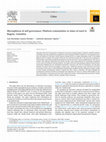
Cities, 2024
This paper delves into the emergence of alternative governance models in Bogotá, Colombia, enable... more This paper delves into the emergence of alternative governance models in Bogotá, Colombia, enabled by platform technology amid state inefficiencies magnified by poorly managed COVID-19 lockdowns. The argument on how these microspheres of alternative self-governance emerged draws on a digital ethnography study of ride-hailing platform drivers in Bogotá who operate within the city's informal economy due to the local lack of regulations. Predominantly representing marginalised populations and servicing lower-income neighbourhoods, these drivers enhance their informal organisation and growth through social media platforms by performing unregulated services such as food delivery during lockdowns. The paper unveils how these platform-mediated self-governance mechanisms challenge the city's institutional frameworks. Centring on the ‘Drivers Club Bogotá’ case, the paper advocates for policy reforms encouraging a ‘partner state’ model that promotes social innovation and citizen involvement in governance. Urban policymakers should harness insights from these informal governance models to better manage post-pandemic realities in Bogotá and other contexts. Ultimately, this paper highlights the transformative potential of platform technologies and emphasises the need for a deeper understanding of platform technologies in fostering social innovation, empowering citizens, and bettering urban governance, thereby promoting inclusive, resilient, and more equitable urban ecosystems.

Australian Geographer, 2023
Platforms are becoming integral elements of urban transport systems, and more recently, platform ... more Platforms are becoming integral elements of urban transport systems, and more recently, platform technology has dominated the debate in implementing Mobility as a Service (MaaS) structures. However, for all the arguments on the impact of platforms on the future of work, and the deterministic technological nature of MaaS discourse, little attention is paid to social engagement and how people use these technologies. This research focuses on how entrepreneurial communities using platforms can challenge preconceptions around what constitutes MaaS and introduce a narrative for achieving mobility justice goals. This paper seeks to broaden the discussion around designing a MaaS policy to include consideration of how urban and regional residents incorporate platforms into everyday mobility practices, and what this might mean for mobility justice. People’s everyday engagement with a range of mobility options and platforms provides insight into how MaaS policy may foster equitable transport outcomes for groups that may be overlooked, marginalised or unrecognised in wider debates. This research from South America which utilises a human-centred approach has significance for other contexts such as Australia, to inform future policy directions which aim to promote mobility justice values.
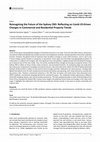
Urban Planning
Covid-19 has led to unprecedented changes in functional structures in our cities. Since the mid-2... more Covid-19 has led to unprecedented changes in functional structures in our cities. Since the mid-20th century, central business districts (CBDs) worldwide have hosted economic and employment activities, leaving suburbia to home the residential function. However, the global Covid-19 responses have resulted in changes in some urban functions, and it is yet to see if these changes would transpire as temporary or permanent. Some argue that the broad macrogeographical pattern of urbanisation is unlikely to be changed. Still, that significant intra-metropolitan, neighbourhood-level and daily life changes are to become part of the new reality. Thus, this article considered these changes by focusing on property trends in the Sydney CBD to reflect on future trends, urban structures, and associated functions. An evaluative single case study desktop analysis was conducted to investigate commercial vacancy rates and rental prices within the CBD of Sydney (Australia) between 2018 and 2021 to refl...
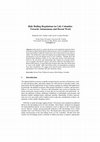
In this article we explore the decent work standard developed by Richard Heeks for digital online... more In this article we explore the decent work standard developed by Richard Heeks for digital online labour markets and use a review of empirical research about ride-hailing to adapt this framework to the location-based service delivery market. The framework is then tested against an in-depth analysis of informality and precarity in the ride hailing sector in Cali, Colombia. Findings show that location-based platform workers in Cali lack many decent work protections. However, the case study also demonstrates that workers are evolving creative ways to grapple with specific aspects of precarity within the ride-hailing sector. Based on this analysis, we argue that policy analysis and worker innovations need to ‘meet in the middle’ rather than follow policy recommendations emanating from other jurisdictions. We suggest some specific policy reforms that will be appropriate to the Colombian and Latin American context.
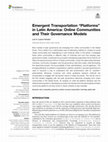
New models of peer governance are emerging from online communities in the Global South. This is v... more New models of peer governance are emerging from online communities in the Global South. This is visible in an understudied case of ridesharing “platforms” created on social media communities and materializing in Latin American cities. In this article, I investigate these online communities in different cities of Colombia and how they develop peer governance models. A particular focus is paid to developing organization forms that do not follow the typical structure of firms. In these communities, I study the relationships between members, community managers, and the governance rules they create, while illuminating the hierarchies present, the accountability of their administrators, and its legitimacy. The emerging literature on platform cooperativism, platform urbanism, and peer governance is used to structure a way to understand this new phenomenon with its “southern” particularities. Moreover, in-person and online qualitative research methods are incorporated to engage with the elu...

Information and Communication Technologies for Development. Strengthening Southern-Driven Cooperation as a Catalyst for ICT4D, 2019
In this article we explore the decent work standard developed by Richard Heeks for digital online... more In this article we explore the decent work standard developed by Richard Heeks for digital online labour markets and use a review of empirical research about ride-hailing to adapt this framework to the location-based service delivery market. The framework is then tested against an in-depth analysis of informality and precarity in the ride hailing sector in Cali, Colombia. Findings show that location-based platform workers in Cali lack many decent work protections. However, the case study also demonstrates that workers are evolving creative ways to grapple with specific aspects of precarity within the ride-hailing sector. Based on this analysis, we argue that policy analysis and worker innovations need to 'meet in the middle' rather than follow policy recommendations emanating from other jurisdictions. We suggest some specific policy reforms that will be appropriate to the Colombian and Latin American context.
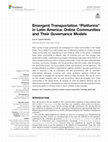
Frontiers in Human Dynamics , 2021
New models of peer governance are emerging from online communities in the Global South. This is v... more New models of peer governance are emerging from online communities in the Global South. This is visible in an understudied case of ridesharing "platforms" created on social media communities and materializing in Latin American cities. In this article, I investigate these online communities in different cities of Colombia and how they develop peer governance models. A particular focus is paid to developing organization forms that do not follow the typical structure of firms. In these communities, I study the relationships between members, community managers, and the governance rules they create, while illuminating the hierarchies present, the accountability of their administrators, and its legitimacy. The emerging literature on platform cooperativism, platform urbanism, and peer governance is used to structure a way to understand this new phenomenon with its "southern" particularities. Moreover, in-person and online qualitative research methods are incorporated to engage with the elusive nature of these structures. This will be one of the first studies engaging with the peer governance dilemmas emerging from online communities in the Global South. An analysis on what the platform literature and the institutional ecosystem in developing countries can harness from the particularities of these community-platforms as they evolve in these contexts is also included.
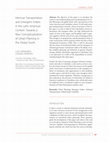
Cosmos + Taxis: Studies in Emergent Order and Organization, 2020
The objective of this paper is to introduce the need of a new understanding and conceptualization... more The objective of this paper is to introduce the need of a new understanding and conceptualization for Urban Planning in the global south, with a special focus in the Latin American and Colombian context. It will study emergent transportation networks, always structurers of the urban space, as a lens to observe how informality, inverse urbanization and emergent orders can help understand the nature of cities in the region, and the global 'south' in general , together with the need of new ways of looking at them. The emergence of spontaneous, and decentralized, forms of order construction will be analyzed within the lines of New Institutional Economics (NIE). Here it will be discussed that the nature of institutional failure and the emergence of informal governance mechanisms adds to the debate of urban mobility planning and urbanism in general. Hypothesizing , whether informality, ingrained in Colombian cities is an expression of a reality of the impossibility of centralized planning for the urban space. Finally, the idea of assessing emergent informal transportation networks in Colombia, is also used as a base to analyze the broad concept of Urban Governance for the global south. Governance is understood here as the emergent evolution of institutions and organizations to solve problems in urban spaces, and which in many cases transgress what's mandated by formal regulation. Therefore, transgression is also analyzed as the processes of informality are linked to historical conditions in Colombian cities, which add a layer of complexity that is considered a staple of a new conceptu-alization of Urban Planning for southern cities.
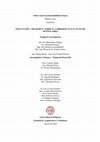
Facultad de Arquitectura y Urbanismo. Documento de trabajo de investigación., 2016
La presente publicación tiene como marco de referencia al Observatorio de Sostenibilidad Urbana, ... more La presente publicación tiene como marco de referencia al Observatorio de Sostenibilidad Urbana, de la Facultad de Arquitectura y Urbanismo de la Universidad de Belgrano (FAU/UB) y se ha llevado a cabo en tres etapas de desarrollo: (2009-2011; 2012-2013; 2014-2016) Durante las dos primeras, se trabajó sobre el proyecto piloto para el Observatorio Inmobiliario de Buenos Aires (OIBA), mientras que la última fase se desarrolló en el marco Observatorio de Sostenibilidad Urbana (OSU), en el contexto de la misma unidad académica de investigación. La investigación se constituye entonces como una aplicación particular de la información generada por el mencionado Observatorio de Sostenibilidad Urbana (OSUBUE), siendo de utilidad para agentes públicos y privados con intereses en la intervención y mejoramiento del contexto urbano y sus implicancias para diversos sectores dentro de este contexto como la movilidad, el transporte de pasajeros, el sector inmobiliario y el espacio público.
¿Cuál es el potencial de las nuevas fuentes de información descentralizada para la planificación ... more ¿Cuál es el potencial de las nuevas fuentes de información descentralizada para la planificación y políticas del Transporte? Analizando el impacto de obras estratégicas de infraestructura vial y del fenómeno de auto compartido en Bogotá D.C y cómo medirlo con Uber Movement.
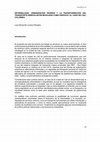
MOBILITAS III, 2019
El propósito de este documento de trabajo es introducir un nuevo acercamiento, si bien controvers... more El propósito de este documento de trabajo es introducir un nuevo acercamiento, si bien controversial al problema de la informalidad y la urbanización inversa dentro del contexto de América Latina, prestando especial atención a la temática del transporte irregular (o extralegal) en la ciudad de Cali, Colombia, el cual puede servir como referente a otras ciudades intermedias de América Latina. El caso de la ciudad de Cali es particularmente interesante considerando que aún después de la introducción de un sistema extenso e integrado de transporte, que suponía una cobertura amplia de las necesidades de movilidad de los habitantes de esta ciudad colombiana, la informalidad se mantuvo como regla y no excepción; viendo que el uso del sistema integrado de transporte masivo propuesto (tipo BRT Bus Rapid Transit) alcanzó un máximo en el año 2015, mientras que las formas de organización colectiva en alternativas informales y no reguladas de transporte aumentó en todos los niveles de ingreso y se vio maximizada con el creciente uso de la motocicleta como una alternativa de transporte colectivo junto con la llegada de plataformas digitales como Uber, Cabify y emprendimientos emergentes locales. Considerando este contexto teórico, el caso de la ciudad de Cali se desarrollará bajo la conceptualización informalidad o irregularidad, ya que se considera que la emergencia de iniciativas individuales y sociales que no se apegan a la regulación existente no definen específicamente su ilegalidad, más su extra legalidad al entender que no existe marco regulatorio en el cual dichas manifestaciones puedan entrar-en el transporte y la movilidad urbanos como la base para analizar este nuevo concepto de gobernanza urbana. Un análisis más profundo permitirá entonces la posibilidad de reconocer algunas características universales sobre el fenómeno de la informalidad y la provisión no-regulada de servicios urbanos, como el transporte suministrado por redes individuales y asociativas de personas, y como el mismo puede aprovecharse como un incipiente modelo de movilidad como servicio. Finalmente se otorgarán algunas recomendaciones de política pública relacionada a los fenómenos estudiados.

Los SIG como herramienta para la Planificación Territorial como esfuerzo de Coordinación: Toma de decisiones y Carteras de Proyectos, 2017
Dentro del marco de un objetivo de articulación de la Planificación del Sistema de Transporte Nac... more Dentro del marco de un objetivo de articulación de la Planificación del Sistema de Transporte Nacional con la Planificación Territorial, y con el apoyo de la Dirección Nacional de Planificación y Coordinación Territorial (DNPyCT) del Ministerio de Transporte de la Nación, -en la cual el suscrito se desempeña laboralmente -es que se desarrolla este trabajo de investigación personal, en el cual se busca alcanzar un conocimiento detallado de la política nacional de planificación del territorio a fin de promover la coordinación y la consulta permanente entre las diferentes áreas de gobierno y organismos regionales competentes en materia de ordenamiento territorial.
El concepto de planificación territorial está cada vez más presente en el ámbito de la administración pública y en los intereses de los organismos multilaterales de crédito como el Banco Mundial, el Banco Interamericano de Desarrollo y la CAF – Banco de Desarrollo, por lo cual el autor de esta investigación considera relevante hacer el salto de escala desde la intervención urbana a la escala territorial, siendo aquí que esta investigación propone utilizar las herramientas de Análisis Territorial que brindan los Sistemas de Información Geográfica, para elaborar sobre el concepto necesario de una PLANIFICACIÓN CONSTRUIDA COMO COORDINACION, en la cual se usen las diferentes carteras de proyectos e inversiones en infraestructura, como instrumentos formuladores de un modelo de gestión de la inversión de transporte sobre el territorio.
Para efectos de esta investigación se propone el software libre (Open Source) QGIS, http://qgis.org , el cual permite una actualización de agregados y hacer el análisis espacial pretendido de una forma más amigable, en términos del conocimiento del programa, para el autor de este proyecto de investigación.
Urbanismo Táctico (Placemaking) – Los límites del Estado y el Ordenamiento Jurídico a la hora de ... more Urbanismo Táctico (Placemaking) – Los límites del Estado y el Ordenamiento Jurídico a la hora de encarar un nuevo paradigma de desarrollo del Espacio Público. ¿Es eficiente la función del estado y la regulación para un urbanismo participativo y ciudadano? El caso de la Intervención en la Calle 13 con Carrera 10 (Eje Ambiental – San Victorino) Bogotá D.C; Colombia.
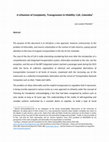
The purpose of this document is to introduce a new approach, however controversial, to the proble... more The purpose of this document is to introduce a new approach, however controversial, to the problem of informality, and inverse urbanization in the context of Latin America, paying special attention to the issue of irregular transportation in the city of Cali, Colombia.
The case of the city of Cali is really interesting considering that even after the introduction of a comprehensive and integrated transportation system, informality remained as the rule, not the exception, and the use of the BRT integrated system reached a passenger-peak during the 2015 while the forms of collective organization in informal and unregulated alternatives of transportation increased in all levels of income, maximized with the increasing use of the motorcycle as a collective transportation alternative and the arrival of Transportation Network Companies such as Uber, Tripda and Cabify.
This problem of urban informality and the implicit transgression to regulation that it represents, is being recently exposed in various circles as a new approach to Urbanity under the concept of 'Planning for Complexity' acknowledging a fact that had been recognized by authors such as Jane Jacobs as long as 50 years ago: The understanding of the reality of self-organizing and complex systems confronted by a constant desire to regulate, to build a type of social engineering that in its supposed omniscience fails to recognize and actually get to know the -again- complexity of the communities, and the individuals that build them.
Governance, under this perspective of complexity analyzed by the document, being in the form of the State or in the form of a supposedly 'free market' based more on corporatism and cronyism than on free competition, will be studied in its own limitations of information, knowledge and resources in order to develop a short diagnostic of the situation in Cali.
Transgression will be presented as circumstantial wherever and whenever the body of governance – clustered in this market-state duality- does not satisfy in its totality the diverse needs of a given population, being obviously clearer in the urban sphere where a demand for good services i.e. transportation, lodging, social interaction, public space, enters in complete confrontation with that which is mandated by forms of regulation, unable to cope with the various realities which define what is Urban, thus leading us to the appearance of networks between individuals and the emergence of the individual entrepreneurship and the sharing economy based on relations and interrelations that are hardly possible to regulate.
Governance of the urban space around the world has already been affected by this reality in which hierarchical planning itself have shifted to a field in which the action of regulation from the state is shared and dissolved by the private sector, it could be argued that regulation should follow the pace and try to cope with the emergence of the different platforms and networks adapting to a new reality in which the concept of governance can conserve its preponderance, however this will indefectibly lead to a zero-sum game in which the regulation will always be outdated due to the emergence of innovation tied to the new technologies being defined as the 4th Industrial Revolution.
Considering this theoretical context, the case of Cali, will use the subject of transgression transportation/mobility as a base to analyze the concept of responsibility and urban governance in order to answer the question of 'Who Plans?' In a reality of complexity, inherent to the urban condition.
As Zygmunt Bauman expressed it, a world of a liquid modernity can't conceive the continuous and stubborn application of ‘Models’ which do not correspond to reality: In this scenario, the responsibility of how cities and territories are studied, intervened and eventually transformed, will be analyzed to hypothesize, whether or not, it falls on the civil society as a network of networks, in which the value of the individual far outpaces whatever intervention by a top-down governance intention, and whether transgression by the civil society is an expression of this reality of impossibility of top-down or centralized planning.
Keywords: Cali, Transportation, Regulation, Self-Organization, Complexity, Network, Civil Society.
Drafts by Luis H. Lozano-Paredes
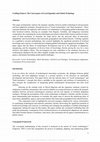
SSRN
This paper preliminarily explores the dynamic interplay between global technological advancements... more This paper preliminarily explores the dynamic interplay between global technological advancements and local adaptation strategies, through the lens of "creole technologies" and "bush mechanics." These concepts illuminate the ingenuity and resilience of communities in integrating global technologies into their localized realities, drawing on examples from Bogotá, Colombia, and indigenous Australian communities. By examining the creole technologies prevalent in urban South America and the inventive spirit of bush mechanics in Australia, the study delves into the universal ethos of innovation, adaptability, and resourcefulness that transcends geographical and cultural barriers. Utilizing vignettes as a qualitative research methodology, this research highlights the significant potential of localized knowledge and creativity in redefining and reshaping global technological engagement paradigms. The paper argues that the future of technological development may lie in the principles of adaptation, repurposing, and the integration of diverse forms of knowledge, thereby paving the way for a more inclusive and adaptive future. This investigation not only contributes to the academic discourse on technological adaptation but also offers tangible insights into fostering a new approach to innovation, agency, and human flourishing amidst global challenges.
Ensayo sobre el Gran Buenos Aires: Estrategias para un nuevo desarrollo urbano. ¿Cómo logramos todos una mejor adherencia a aquello que nos acerca?, 2016
Thesis Chapters by Luis H. Lozano-Paredes
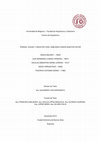
“Transformarse significa que el que juega, pierde en el juego su identidad porque quien juega, re... more “Transformarse significa que el que juega, pierde en el juego su identidad porque quien juega, realmente es el propio juego... Así la obra, al construirse transforma a aquel que construye. Quiere esto decir que, una vez iniciada la construcción, lo construido es quien construye. La obra se hace. Hay un hacerse que escapa a la voluntad de quien toma un lápiz o una pluma"... Chantal Maillard, prólogo referido a H. Michaux, Escritos sobre pintura, Colegio de Aparejadores y Arquitectos de Murcia, Murcia, 2007. Como muy lúcidamente lo expone Chantal Maillard, el Trabajo Final de Carrera es un proceso y obra de pura transformación y de encuentro con aquellas capacidades ocultas en cada uno, las cuales eventualmente devienen en una transformación a nivel personal-profesional que lo introduce a un nuevo mundo de infinitas posibilidades y donde cada uno va a construir su futuro dentro de la profesión, ya no desde esquemas sobreimpuestos de aquello que tiene que ser el Arquitecto sino sobre cada lugar insospechado en el que la profesión tiene su desarrollo. Después de ser partícipes de esa transformación es menester dedicar y desempeñar nuestra obra de una manera ética y por sobre todo, implicada con un hablar desde nuestra posición Argentina y Latinoamericana, pudiendo hacer honor a aquella frase del maestro Claudio Caveri que conmina al “Pensar desde aquí”. El Trabajo Final de Carrera se desarrolla al sur de la Ciudad de Buenos Aires, más específicamente en un sector del barrio de Barracas, donde la relación urbana entre el viaducto ferroviario, la estación Hipólito Yrigoyen y el Centro Metropolitano de Diseño constituyen un espacio de necesaria re-funcionalización, re-significación y re-inserción tanto a escala urbana como a escala arquitectónica, en el planteo de una vivienda colectiva para una manzana atípica del barrio. La idea central que se plantea para la resolución de este proyecto –el cual ha sido en cierta manera, pretexto ya que permite involucrarse con una realidad tangible- es devolver la ciudad a las personas que la habitan, en base al planteo de un proceso de acercamiento a la Arquitectura y el Urbanismo que involucre no sólo el proceso de proyección, sino la implicación del Arquitecto en el lugar, en el estar y cómo el mismo se transforma finalmente en un agente colaborador con la final implicación por parte de los habitantes de la ciudad los cuales cierran una nueva concepción de la buena arquitectura para los que vivimos en la urbe y aquellos que nos sucederán.
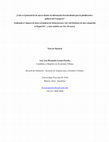
El objetivo principal de esta investigación se fundamentará en reconocer y explotar el valor de l... more El objetivo principal de esta investigación se fundamentará en reconocer y explotar el valor de la información descentralizada para la planificación urbana y del transporte, proporcionada por plataformas como Uber, y específicamente su sistema de información de tráfico y tiempos de viaje agregados, Uber Movement. Esto en contraste con la visión de centralizar la recolección de datos en un esquema de “sensorización” unificado, o depender únicamente de la información obtenida por medio de los métodos tradicionales de recolección de información por medio de encuestas origen-destino.
Esta investigación utiliza dos fuentes diferentes de recopilación de datos para explorar y comparar la utilidad de las nuevas técnicas descentralizadas de obtención de datos con las técnicas centralizadas que actualmente existen en la planificación urbana. Se examina entonces cómo el uso de esta información puede ayudar a evaluar los impactos de la inversión en la infraestructura urbana, y los fenómenos emergentes como los viajes compartidos, a fin de promover una mejor planificación hacia futuras inversiones.
El análisis matizado demostrará finalmente que las nuevas técnicas ofrecen ganancias sobre las más antiguas, ya que permiten destacar el valor de los sistemas descentralizados de información como una herramienta innovadora para la planificación urbana y del transporte. También encontrando que ambas técnicas se pueden combinar para crear estructuras aún más fuertes y flexibles para el desarrollo de la inversión pública en las ciudades.
Palabras clave: Capitalismo de Plataforma, Plataformas Digitales, Congestión, Información Descentralizada, Planificación, Transporte, Infraestructura
Books by Luis H. Lozano-Paredes

Urban Transport in the Sharing Economy Era - Collaborative Cities, 2018
Pg. 92-128
The disruptions created by the digital platform economy have caused both policy maker... more Pg. 92-128
The disruptions created by the digital platform economy have caused both policy makers and workers to generate adaptations to a rapidly changing context. These disruptions are challenging existing definitions of informality and precarity, as well as standard policy responses to worker rights and protections. While pre-venting precarity is still very much the goal of policy interventions, the idea that ‘informality’ is the cause of precarity has come to be questioned. In this article we introduce the decent work standard developed by Richard Heeks for digital online labour markets like Freelancer, Upwork or Amazon Mechanical Turk. We use a literature review of empirical research about ride-hailing to adapt this framework to the ‘location-based service delivery’ market. This new framework is then tested against an in-depth analysis of informality and precarity in the ride hailing sec-tor in Cali-Colombia. Findings from this research show that platform workers lack many of the protections recommended by Heeks’ decent work framework. However, the case study also demonstrates that workers are evolving some creative ways to grapple with specific aspects of precarity within the ride-hailing sector. Based on this analysis, we argue that policy analysis and worker innova-tions need to ‘meet in the middle’ and suggest some specific policy reforms that will be appropriate to the Colombian and Latin American context.

Uploads
Papers by Luis H. Lozano-Paredes
El concepto de planificación territorial está cada vez más presente en el ámbito de la administración pública y en los intereses de los organismos multilaterales de crédito como el Banco Mundial, el Banco Interamericano de Desarrollo y la CAF – Banco de Desarrollo, por lo cual el autor de esta investigación considera relevante hacer el salto de escala desde la intervención urbana a la escala territorial, siendo aquí que esta investigación propone utilizar las herramientas de Análisis Territorial que brindan los Sistemas de Información Geográfica, para elaborar sobre el concepto necesario de una PLANIFICACIÓN CONSTRUIDA COMO COORDINACION, en la cual se usen las diferentes carteras de proyectos e inversiones en infraestructura, como instrumentos formuladores de un modelo de gestión de la inversión de transporte sobre el territorio.
Para efectos de esta investigación se propone el software libre (Open Source) QGIS, http://qgis.org , el cual permite una actualización de agregados y hacer el análisis espacial pretendido de una forma más amigable, en términos del conocimiento del programa, para el autor de este proyecto de investigación.
The case of the city of Cali is really interesting considering that even after the introduction of a comprehensive and integrated transportation system, informality remained as the rule, not the exception, and the use of the BRT integrated system reached a passenger-peak during the 2015 while the forms of collective organization in informal and unregulated alternatives of transportation increased in all levels of income, maximized with the increasing use of the motorcycle as a collective transportation alternative and the arrival of Transportation Network Companies such as Uber, Tripda and Cabify.
This problem of urban informality and the implicit transgression to regulation that it represents, is being recently exposed in various circles as a new approach to Urbanity under the concept of 'Planning for Complexity' acknowledging a fact that had been recognized by authors such as Jane Jacobs as long as 50 years ago: The understanding of the reality of self-organizing and complex systems confronted by a constant desire to regulate, to build a type of social engineering that in its supposed omniscience fails to recognize and actually get to know the -again- complexity of the communities, and the individuals that build them.
Governance, under this perspective of complexity analyzed by the document, being in the form of the State or in the form of a supposedly 'free market' based more on corporatism and cronyism than on free competition, will be studied in its own limitations of information, knowledge and resources in order to develop a short diagnostic of the situation in Cali.
Transgression will be presented as circumstantial wherever and whenever the body of governance – clustered in this market-state duality- does not satisfy in its totality the diverse needs of a given population, being obviously clearer in the urban sphere where a demand for good services i.e. transportation, lodging, social interaction, public space, enters in complete confrontation with that which is mandated by forms of regulation, unable to cope with the various realities which define what is Urban, thus leading us to the appearance of networks between individuals and the emergence of the individual entrepreneurship and the sharing economy based on relations and interrelations that are hardly possible to regulate.
Governance of the urban space around the world has already been affected by this reality in which hierarchical planning itself have shifted to a field in which the action of regulation from the state is shared and dissolved by the private sector, it could be argued that regulation should follow the pace and try to cope with the emergence of the different platforms and networks adapting to a new reality in which the concept of governance can conserve its preponderance, however this will indefectibly lead to a zero-sum game in which the regulation will always be outdated due to the emergence of innovation tied to the new technologies being defined as the 4th Industrial Revolution.
Considering this theoretical context, the case of Cali, will use the subject of transgression transportation/mobility as a base to analyze the concept of responsibility and urban governance in order to answer the question of 'Who Plans?' In a reality of complexity, inherent to the urban condition.
As Zygmunt Bauman expressed it, a world of a liquid modernity can't conceive the continuous and stubborn application of ‘Models’ which do not correspond to reality: In this scenario, the responsibility of how cities and territories are studied, intervened and eventually transformed, will be analyzed to hypothesize, whether or not, it falls on the civil society as a network of networks, in which the value of the individual far outpaces whatever intervention by a top-down governance intention, and whether transgression by the civil society is an expression of this reality of impossibility of top-down or centralized planning.
Keywords: Cali, Transportation, Regulation, Self-Organization, Complexity, Network, Civil Society.
Drafts by Luis H. Lozano-Paredes
Thesis Chapters by Luis H. Lozano-Paredes
Esta investigación utiliza dos fuentes diferentes de recopilación de datos para explorar y comparar la utilidad de las nuevas técnicas descentralizadas de obtención de datos con las técnicas centralizadas que actualmente existen en la planificación urbana. Se examina entonces cómo el uso de esta información puede ayudar a evaluar los impactos de la inversión en la infraestructura urbana, y los fenómenos emergentes como los viajes compartidos, a fin de promover una mejor planificación hacia futuras inversiones.
El análisis matizado demostrará finalmente que las nuevas técnicas ofrecen ganancias sobre las más antiguas, ya que permiten destacar el valor de los sistemas descentralizados de información como una herramienta innovadora para la planificación urbana y del transporte. También encontrando que ambas técnicas se pueden combinar para crear estructuras aún más fuertes y flexibles para el desarrollo de la inversión pública en las ciudades.
Palabras clave: Capitalismo de Plataforma, Plataformas Digitales, Congestión, Información Descentralizada, Planificación, Transporte, Infraestructura
Books by Luis H. Lozano-Paredes
The disruptions created by the digital platform economy have caused both policy makers and workers to generate adaptations to a rapidly changing context. These disruptions are challenging existing definitions of informality and precarity, as well as standard policy responses to worker rights and protections. While pre-venting precarity is still very much the goal of policy interventions, the idea that ‘informality’ is the cause of precarity has come to be questioned. In this article we introduce the decent work standard developed by Richard Heeks for digital online labour markets like Freelancer, Upwork or Amazon Mechanical Turk. We use a literature review of empirical research about ride-hailing to adapt this framework to the ‘location-based service delivery’ market. This new framework is then tested against an in-depth analysis of informality and precarity in the ride hailing sec-tor in Cali-Colombia. Findings from this research show that platform workers lack many of the protections recommended by Heeks’ decent work framework. However, the case study also demonstrates that workers are evolving some creative ways to grapple with specific aspects of precarity within the ride-hailing sector. Based on this analysis, we argue that policy analysis and worker innova-tions need to ‘meet in the middle’ and suggest some specific policy reforms that will be appropriate to the Colombian and Latin American context.
El concepto de planificación territorial está cada vez más presente en el ámbito de la administración pública y en los intereses de los organismos multilaterales de crédito como el Banco Mundial, el Banco Interamericano de Desarrollo y la CAF – Banco de Desarrollo, por lo cual el autor de esta investigación considera relevante hacer el salto de escala desde la intervención urbana a la escala territorial, siendo aquí que esta investigación propone utilizar las herramientas de Análisis Territorial que brindan los Sistemas de Información Geográfica, para elaborar sobre el concepto necesario de una PLANIFICACIÓN CONSTRUIDA COMO COORDINACION, en la cual se usen las diferentes carteras de proyectos e inversiones en infraestructura, como instrumentos formuladores de un modelo de gestión de la inversión de transporte sobre el territorio.
Para efectos de esta investigación se propone el software libre (Open Source) QGIS, http://qgis.org , el cual permite una actualización de agregados y hacer el análisis espacial pretendido de una forma más amigable, en términos del conocimiento del programa, para el autor de este proyecto de investigación.
The case of the city of Cali is really interesting considering that even after the introduction of a comprehensive and integrated transportation system, informality remained as the rule, not the exception, and the use of the BRT integrated system reached a passenger-peak during the 2015 while the forms of collective organization in informal and unregulated alternatives of transportation increased in all levels of income, maximized with the increasing use of the motorcycle as a collective transportation alternative and the arrival of Transportation Network Companies such as Uber, Tripda and Cabify.
This problem of urban informality and the implicit transgression to regulation that it represents, is being recently exposed in various circles as a new approach to Urbanity under the concept of 'Planning for Complexity' acknowledging a fact that had been recognized by authors such as Jane Jacobs as long as 50 years ago: The understanding of the reality of self-organizing and complex systems confronted by a constant desire to regulate, to build a type of social engineering that in its supposed omniscience fails to recognize and actually get to know the -again- complexity of the communities, and the individuals that build them.
Governance, under this perspective of complexity analyzed by the document, being in the form of the State or in the form of a supposedly 'free market' based more on corporatism and cronyism than on free competition, will be studied in its own limitations of information, knowledge and resources in order to develop a short diagnostic of the situation in Cali.
Transgression will be presented as circumstantial wherever and whenever the body of governance – clustered in this market-state duality- does not satisfy in its totality the diverse needs of a given population, being obviously clearer in the urban sphere where a demand for good services i.e. transportation, lodging, social interaction, public space, enters in complete confrontation with that which is mandated by forms of regulation, unable to cope with the various realities which define what is Urban, thus leading us to the appearance of networks between individuals and the emergence of the individual entrepreneurship and the sharing economy based on relations and interrelations that are hardly possible to regulate.
Governance of the urban space around the world has already been affected by this reality in which hierarchical planning itself have shifted to a field in which the action of regulation from the state is shared and dissolved by the private sector, it could be argued that regulation should follow the pace and try to cope with the emergence of the different platforms and networks adapting to a new reality in which the concept of governance can conserve its preponderance, however this will indefectibly lead to a zero-sum game in which the regulation will always be outdated due to the emergence of innovation tied to the new technologies being defined as the 4th Industrial Revolution.
Considering this theoretical context, the case of Cali, will use the subject of transgression transportation/mobility as a base to analyze the concept of responsibility and urban governance in order to answer the question of 'Who Plans?' In a reality of complexity, inherent to the urban condition.
As Zygmunt Bauman expressed it, a world of a liquid modernity can't conceive the continuous and stubborn application of ‘Models’ which do not correspond to reality: In this scenario, the responsibility of how cities and territories are studied, intervened and eventually transformed, will be analyzed to hypothesize, whether or not, it falls on the civil society as a network of networks, in which the value of the individual far outpaces whatever intervention by a top-down governance intention, and whether transgression by the civil society is an expression of this reality of impossibility of top-down or centralized planning.
Keywords: Cali, Transportation, Regulation, Self-Organization, Complexity, Network, Civil Society.
Esta investigación utiliza dos fuentes diferentes de recopilación de datos para explorar y comparar la utilidad de las nuevas técnicas descentralizadas de obtención de datos con las técnicas centralizadas que actualmente existen en la planificación urbana. Se examina entonces cómo el uso de esta información puede ayudar a evaluar los impactos de la inversión en la infraestructura urbana, y los fenómenos emergentes como los viajes compartidos, a fin de promover una mejor planificación hacia futuras inversiones.
El análisis matizado demostrará finalmente que las nuevas técnicas ofrecen ganancias sobre las más antiguas, ya que permiten destacar el valor de los sistemas descentralizados de información como una herramienta innovadora para la planificación urbana y del transporte. También encontrando que ambas técnicas se pueden combinar para crear estructuras aún más fuertes y flexibles para el desarrollo de la inversión pública en las ciudades.
Palabras clave: Capitalismo de Plataforma, Plataformas Digitales, Congestión, Información Descentralizada, Planificación, Transporte, Infraestructura
The disruptions created by the digital platform economy have caused both policy makers and workers to generate adaptations to a rapidly changing context. These disruptions are challenging existing definitions of informality and precarity, as well as standard policy responses to worker rights and protections. While pre-venting precarity is still very much the goal of policy interventions, the idea that ‘informality’ is the cause of precarity has come to be questioned. In this article we introduce the decent work standard developed by Richard Heeks for digital online labour markets like Freelancer, Upwork or Amazon Mechanical Turk. We use a literature review of empirical research about ride-hailing to adapt this framework to the ‘location-based service delivery’ market. This new framework is then tested against an in-depth analysis of informality and precarity in the ride hailing sec-tor in Cali-Colombia. Findings from this research show that platform workers lack many of the protections recommended by Heeks’ decent work framework. However, the case study also demonstrates that workers are evolving some creative ways to grapple with specific aspects of precarity within the ride-hailing sector. Based on this analysis, we argue that policy analysis and worker innova-tions need to ‘meet in the middle’ and suggest some specific policy reforms that will be appropriate to the Colombian and Latin American context.